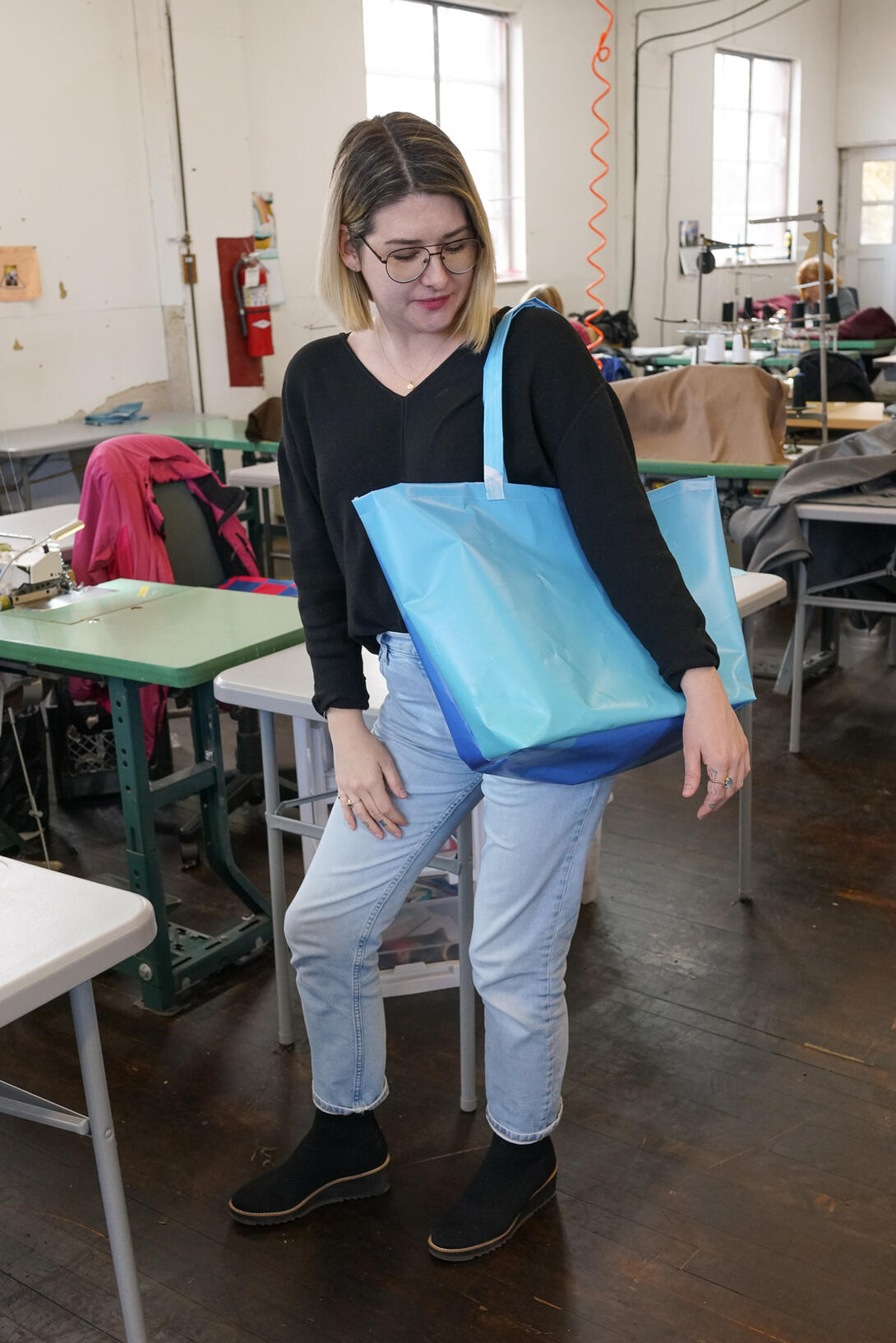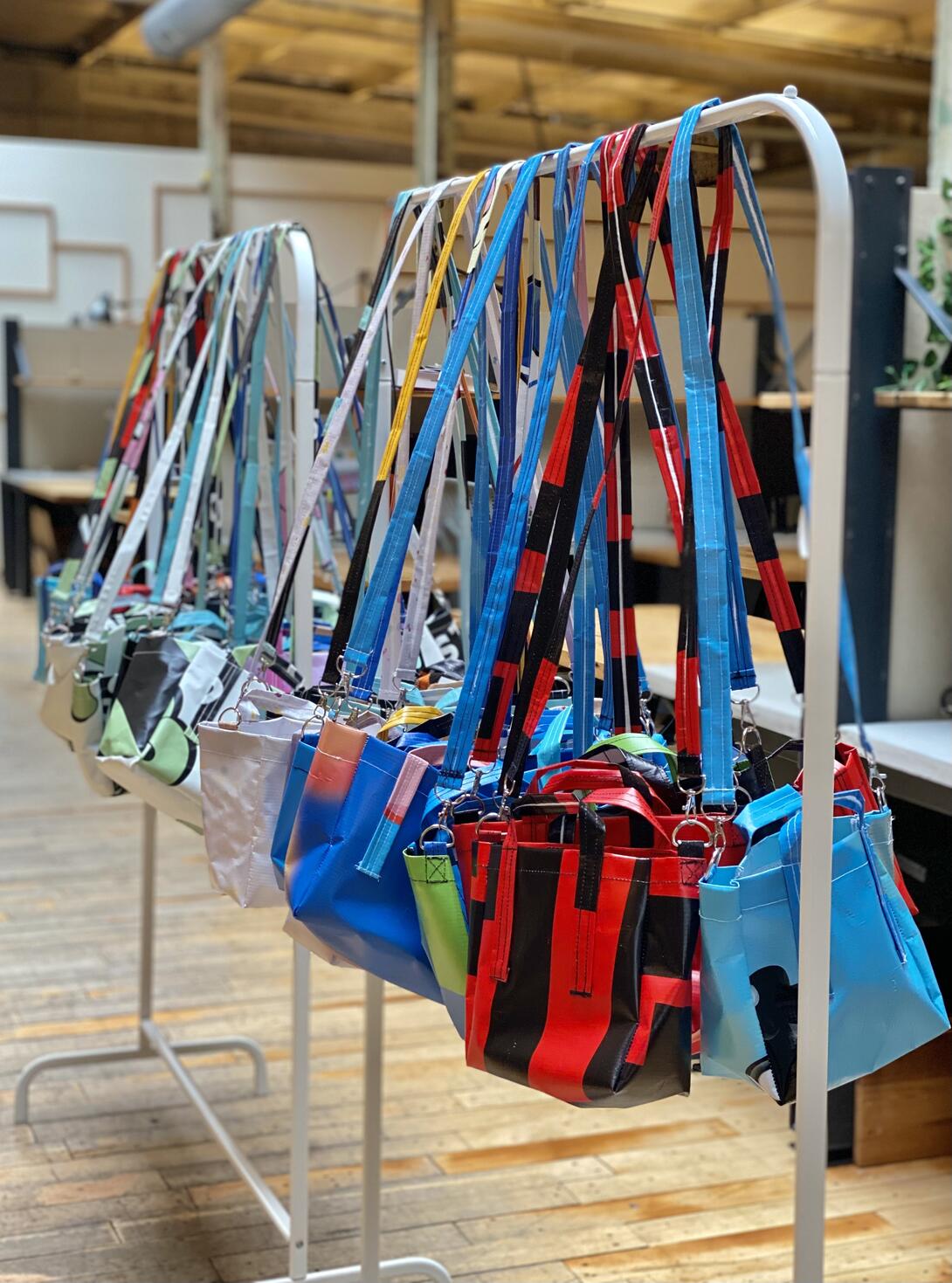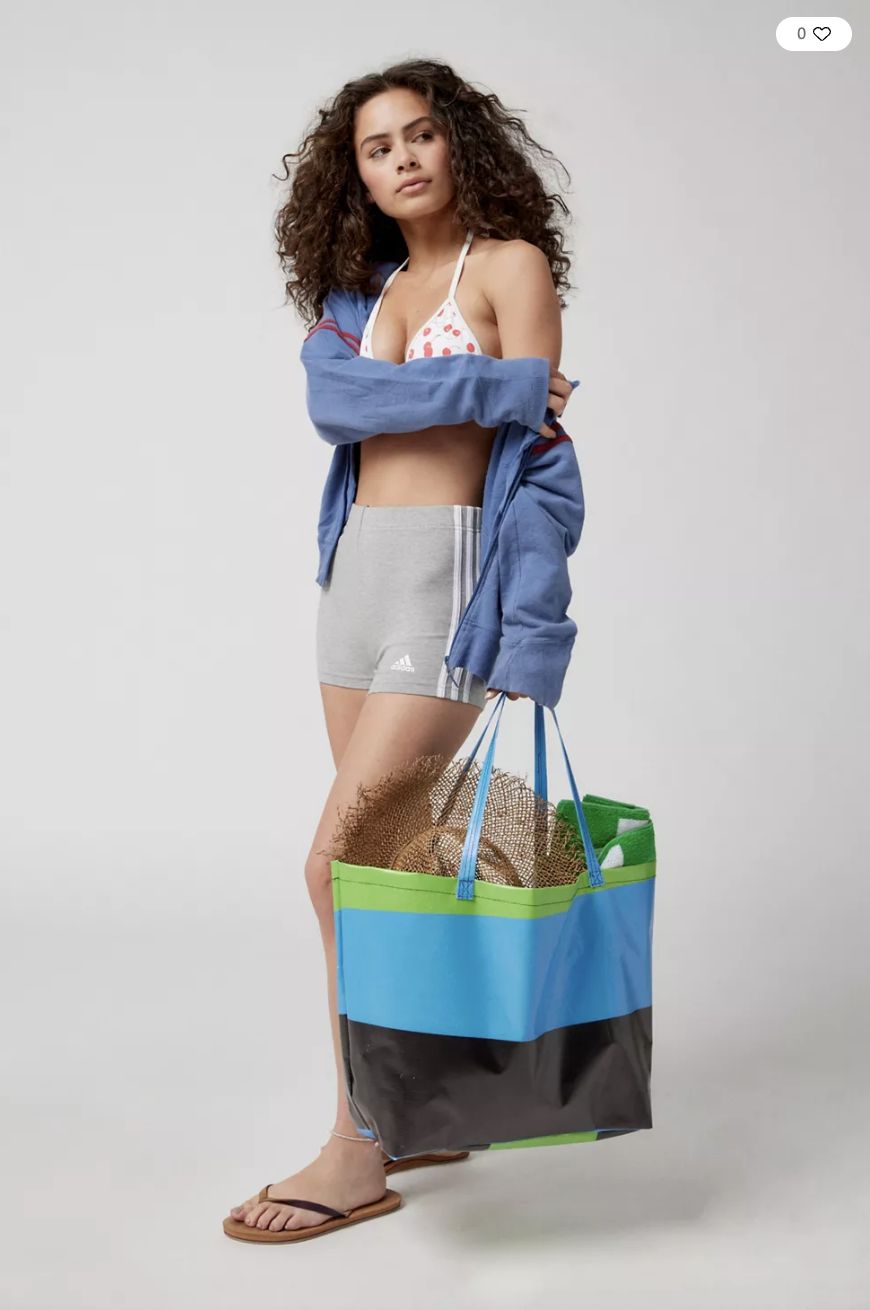Alumna Liz McDonough Releases Line of Upcycled Bags for Urban Outfitters

Liz McDonough, a Master of Arts in Design Alumna of Carnegie Mellon University’s School of Design (MA ’22), recently designed and released a line of upcycled bags through Urban Outfitters. McDonough, who currently serves as the Experiential Marketing Manager for Urban Outfitters, launched the line of bags, made from 500 square feet of used vinyl signage, on Earth Day 2023.
The idea for this line came from McDonough’s work as Experiential Marketing Manager, overseeing the creative direction, planning, and execution of Urban Outfitters’ branded events, which range from hype events celebrating the launch of new products, meet and greets with musicians, and cultural tentpole moments around festivals like SXSW and Coachella. At a great deal of these events, the Brand Marketing Team would typically create giant stage banners that could be as large as 20 feet tall by 12 feet wide.
McDonough’s inspiration for the line of upcycled bags came from a large banner that was used for an Urban Outfitters music event in 2022.
“As we were wrapping the event and breaking down the stage, I watched the vinyl stage banner being rolled up and I saw an opportunity,” said McDonough. “It was a huge cut of colorful, patterned, durable material, but not something we had a use for beyond the event. I felt strongly it shouldn't be thrown away, so I shipped it back to my apartment while I ruminated on how best to upcycle it. I am sort of notorious for this and often find myself bringing discarded objects and materials home -- both to do my small part in disrupting the waste stream, but also because I love an upcycling project, especially one that allows me to experiment with unexpected/found materials.”
“The banner sat in its box for a few months until one night in January 2023 when I was struck with the inspiration to transform it into different styles of bags,” continued McDonough. “I had seen this done while working for the Sundance Film Festival from 2013-2015 and the concept has always stayed with me. I spent all night building prototypes and brought them into the office the next morning to pitch the idea. One conversation led to another, and I began piecing together a team of incredible collaborators spanning across the URBN organization from Brand Marketing and Buying teams to Production & Sourcing, Sustainability & Social Impact, and beyond. The unrelenting support and enthusiasm from these amazing cross-functional partners helped bring the concept from vision to reality in just over 3 months.”
In April 2023, Earth Day, Urban Outfitters launched a 100 SKU collection of one-of-a-kind bags, all made from vinyl signage from past events. The collection launched online and in key store locations – Urban Outfitters NY Herald Square and Urban Outfitters San Francisco Union Square.
The collection sold out online in 72 hours.

McDonough attributes much of her knowledge and passion for circularity and sustainability to the School of Design, in particular Jonathan Chapman's courses, often referencing notes and texts throughout this process.
“I have always been interested in recycling and reuse, and I came to CMU fresh off working at an e-comm retailer and certified B-Corp with sustainability as a key brand pillar,” said McDonough. “I thought I had a pretty solid understanding of the term, but after diving into the curriculum at CMU, I realized there was so much more to learn, and I soaked it up. Analyzing our relationship with the physical world and understanding the consequences of material waste, along with themes of circularity and systems thinking were present throughout, especially in Jonathan Chapman's courses, Design Minds and Design That Lasts. Upon graduating, I knew I wanted to implement this knowledge into whatever role I pursued, and the vinyl bag project happened to be an actionable opportunity from where I sat.”
“Throughout the design process for the collection, I found myself referencing notes and readings from these two classes -- refamiliarizing myself with circular mechanisms that brands have successfully acted on, the value and importance of highlighting the past life of the material, design details to engage the user that reach beyond the tactile,” continued McDonough. “I feel strongly about these considerations for the obvious reasons -- most notably, the current state of the environment and the role that broken recycling streams, an overabundance of material waste, and single-use objects have played in its demise, and I want to do my small part to disrupt these systems -- but I also love the challenge that comes with designing with strict parameters, and allowing found materials to generate ideas. My best ideas are realized when I have little to no resources. And in the case of the vinyl bags, this type of product allows individuals to engage with upcycling and circularity through the lens of a ubiquitous object that they understand and use every day: a tote bag. I believe there's something very powerful in that.”

Now that the collection has sold out, McDonough has plans for another run of bags in the near future.
“The intention moving forward would be to fabricate the bags directly after the event from which they came as a way to extend the experience and offer something special to those who attended,” said McDonough. “This also allows us to share the event with those who were unable to attend, injecting some inclusivity into the experience.”
Along with the upcycled bags, McDonough will be partnering more closely with the Sustainability & Social Impact team at Urban Outfitters to explore opportunities to recirculate off-cut fabrics from their own production process. But McDonough’s passion for sustainability doesn’t end at Urban Outfitters.
“Personally, I am on the cusp of launching my own design studio and aim to showcase a fabrication process I explored at CMU in the IxD Studio Course,” said McDonough. “I'm interested in disrupting the cardboard and paper recycling streams and turning these materials, along with a little flour and water, into furniture and home decor. Many corporations are moving to plastic-free solutions and in turn, reaching for cardboard and paper alternatives -- while paper and cardboard decompose faster than plastic, the recycling stream for these materials is equally problematic.”